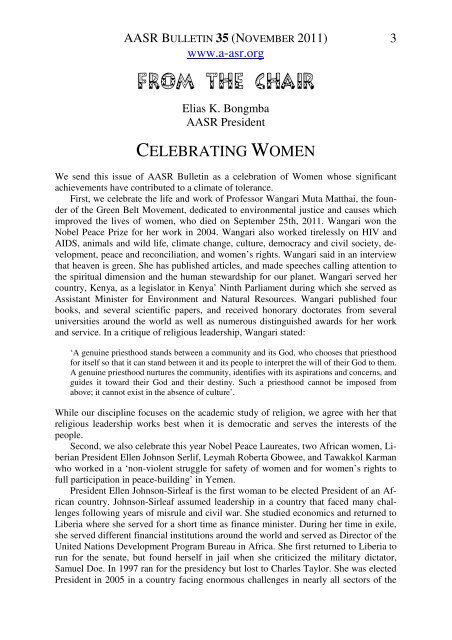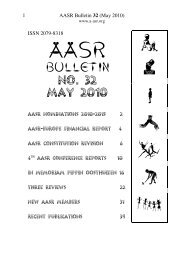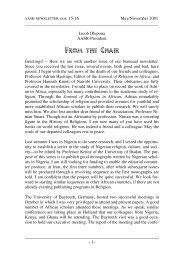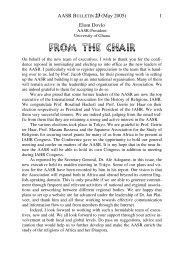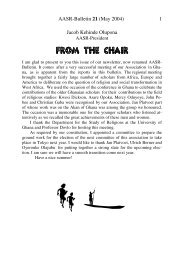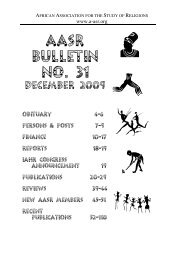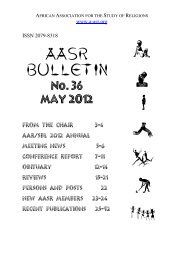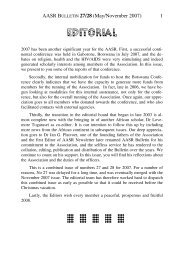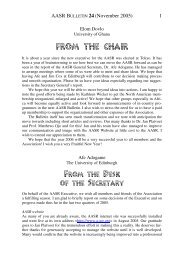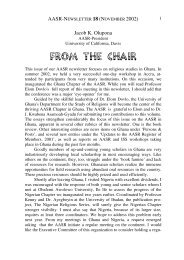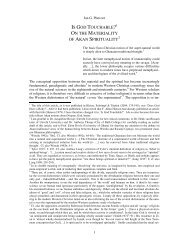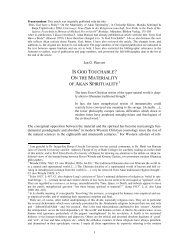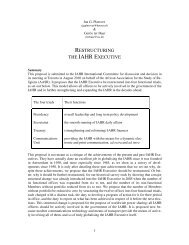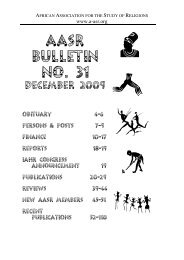AASR Bulletin 35 - The African Association for the Study of Religions
AASR Bulletin 35 - The African Association for the Study of Religions
AASR Bulletin 35 - The African Association for the Study of Religions
You also want an ePaper? Increase the reach of your titles
YUMPU automatically turns print PDFs into web optimized ePapers that Google loves.
<strong>AASR</strong> BULLETIN <strong>35</strong> (NOVEMBER 2011)<br />
www.a-asr.org<br />
FROM THE CHAIR<br />
Elias K. Bongmba<br />
<strong>AASR</strong> President<br />
3<br />
CELEBRATING WOMEN<br />
We send this issue <strong>of</strong> <strong>AASR</strong> <strong>Bulletin</strong> as a celebration <strong>of</strong> Women whose significant<br />
achievements have contributed to a climate <strong>of</strong> tolerance.<br />
First, we celebrate <strong>the</strong> life and work <strong>of</strong> Pr<strong>of</strong>essor Wangari Muta Matthai, <strong>the</strong> founder<br />
<strong>of</strong> <strong>the</strong> Green Belt Movement, dedicated to environmental justice and causes which<br />
improved <strong>the</strong> lives <strong>of</strong> women, who died on September 25th, 2011. Wangari won <strong>the</strong><br />
Nobel Peace Prize <strong>for</strong> her work in 2004. Wangari also worked tirelessly on HIV and<br />
AIDS, animals and wild life, climate change, culture, democracy and civil society, development,<br />
peace and reconciliation, and women’s rights. Wangari said in an interview<br />
that heaven is green. She has published articles, and made speeches calling attention to<br />
<strong>the</strong> spiritual dimension and <strong>the</strong> human stewardship <strong>for</strong> our planet. Wangari served her<br />
country, Kenya, as a legislator in Kenya’ Ninth Parliament during which she served as<br />
Assistant Minister <strong>for</strong> Environment and Natural Resources. Wangari published four<br />
books, and several scientific papers, and received honorary doctorates from several<br />
universities around <strong>the</strong> world as well as numerous distinguished awards <strong>for</strong> her work<br />
and service. In a critique <strong>of</strong> religious leadership, Wangari stated:<br />
‘A genuine priesthood stands between a community and its God, who chooses that priesthood<br />
<strong>for</strong> itself so that it can stand between it and its people to interpret <strong>the</strong> will <strong>of</strong> <strong>the</strong>ir God to <strong>the</strong>m.<br />
A genuine priesthood nurtures <strong>the</strong> community, identifies with its aspirations and concerns, and<br />
guides it toward <strong>the</strong>ir God and <strong>the</strong>ir destiny. Such a priesthood cannot be imposed from<br />
above; it cannot exist in <strong>the</strong> absence <strong>of</strong> culture’.<br />
While our discipline focuses on <strong>the</strong> academic study <strong>of</strong> religion, we agree with her that<br />
religious leadership works best when it is democratic and serves <strong>the</strong> interests <strong>of</strong> <strong>the</strong><br />
people.<br />
Second, we also celebrate this year Nobel Peace Laureates, two <strong>African</strong> women, Liberian<br />
President Ellen Johnson Serlif, Leymah Roberta Gbowee, and Tawakkol Karman<br />
who worked in a ‘non-violent struggle <strong>for</strong> safety <strong>of</strong> women and <strong>for</strong> women’s rights to<br />
full participation in peace-building’ in Yemen.<br />
President Ellen Johnson-Sirleaf is <strong>the</strong> first woman to be elected President <strong>of</strong> an <strong>African</strong><br />
country. Johnson-Sirleaf assumed leadership in a country that faced many challenges<br />
following years <strong>of</strong> misrule and civil war. She studied economics and returned to<br />
Liberia where she served <strong>for</strong> a short time as finance minister. During her time in exile,<br />
she served different financial institutions around <strong>the</strong> world and served as Director <strong>of</strong> <strong>the</strong><br />
United Nations Development Program Bureau in Africa. She first returned to Liberia to<br />
run <strong>for</strong> <strong>the</strong> senate, but found herself in jail when she criticized <strong>the</strong> military dictator,<br />
Samuel Doe. In 1997 ran <strong>for</strong> <strong>the</strong> presidency but lost to Charles Taylor. She was elected<br />
President in 2005 in a country facing enormous challenges in nearly all sectors <strong>of</strong> <strong>the</strong>


